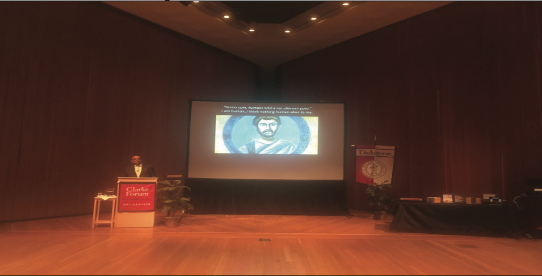Morgan Lecturer Argues for Cosmopolitan Identities

The Anita Tuvin Schlecter Auditorium was filled to the brim for the annual Morgan Lecture, this year given by Kwame Anthony Appiah of New York University.
Appiah began his lecture by discussing the role of race in the construction of personal identities: individuals are necessarily shaped by their backgrounds, but also shared cultural constructs about their backgrounds, and how these categorizations become essential elements to individuals in constructing conceptions of self. “Every identity comes with labels,” Appiah noted, before asking the question “Can a Muslim really be Danish?” noting that common conceptions of the characteristic of being Danish does not include the quality of being Muslim, and questioning the essentiality and rigidity in norms of conceptions.
He continued through observing how these shared cultural elements serve to foster communities which otherwise would not exist, citing the shared cultural experiences of Catholicism which unites otherwise disparate individuals. However, Appiah noted that these cultural identifications may serve as double edged swords, as although they may draw individuals together, they allow for other individuals to generalize individuals based on their cultural qualities. By the psychological creation of societal classes with particular essences, individuals are reduced to their group characteristics. Appiah furthered that individuals are more likely to essentialize groups about which individuals already possess strong feelings, creating stereotypes through undue emphasis on ether perceived positive or negative characteristics, such as race, gender, religion, or sexual orientation.
Appiah then explained how these distinctions have been used to develop class distinctions within society. He noted that how imparting the idea of meritocracy into society through educational and societal structures creates a stratification of society used to distinguish ‘good’ and ‘bad’ children from an early age, and confer advantages on those judged good, despite this designation coming from morally arbitrary qualities. . “Class identities in meritocracy reduce people to a single measure of worth,” Appiah said, that being our economic output. He continued that this ignores that “each of us comes equipped with a different set of talents.” Appiah furthered that an emphasis on the economic output of individual leads to this value being conflated with the total worth of that individual, rather than allowing for considerations of other values individuals may possess. “What is important is to do our best,” said Appiah, “Even if we are going to reward hard work, the capacity of hard work is itself an individual capacity.”
Appiah continued his lecture through the recognition that certain characteristics of individuals, such as the location and circumstances of one’s birth, are morally arbitrary, as they are not in any way under the control of the individual in question. Appiah cautioned however that equalizing differences arising from these issues cannot come at the expense of those well-off, noting we instead need to “eradicate contempt” for those considered lower within societal hierarchies. “We live in a plenitude of hierarchies,” Appiah said, “we cannot fully control the distributions of” goods within society. However, this does not justify “needless hierarchies of status” within societies.These issues of identity are, to Appiah, forms of tribalism, and that current political divides in the United States are understandable through this lens. He argued that political “Identity here precedes ideology,” as “Identity based ideology [is] not ideology at all.” He argued that “Political cleavages [may considered a statement by one group to another of] I hate your tribe,” defending his claim by citing an argument that parents in the United States tend to possess strong feelings about the political party identification of their children’s spouses. However, despite these divisions, individuals may also possess a national identity, serving to unite otherwise opposed political groups. “For the citizens of divided nations, one of our identities is that of the national identity,” he said, “We are charged with directly the ship of state together.”
Tribes “don’t have to agree. They just have to accept one another,” Appiah noted while arguing in favor of individuals collectively taking responsibility for protecting the national welfare. Despite varying conceptions of what is good for society, a requirement of living in a democratic society is, according to Appiah, toleration. “Right now, we need to find ways to draw on our non-partisan identities […] to combat the tribalism that is undermining our democracy,” he said.
Appiah noted however that these identities cannot simply be ignored. Rather, the identities of individuals needs to be redefined, to place emphasis not on divisions, but to address a “desperate need of global citizenship.” “Cosmopolitans value cross cultural encounters which would be pointless is everywhere was the same,” Appiah said, noting that loyalties are not necessarily mutually exclusive.
Appiah concluded his lecture by reflecting on the difficulty of bringing about this change. He noted that bringing about this cosmopolitanism cannot simply be an economic function, as people are instead searching for “meaningful employment, and a living wage.” Appiah argued that this shift towards cosmopolitanism will instead come about when recognition within society is not based on strict economic wealth, but rather a form of capitalism which defines the worth of individuals based on the necessity of their contributions to society. “I reject the thought that capitalism is the problem. We need to do capitalism properly.” Appiah noted that this change, however, need come from all sides. “It’s a symmetrical situation.” It’s not about conceding a moral point.”
Reactions to the lecture were generally positive. Nathan Stull ’21 said “I thought it was very enlightening. I’m not from a philosophic background, and it really opened my eyes.”
Joel Thomsen ’20 added “I thought it was really interesting. Overall, I thought it was a really good lecture that really gave me a deeper insight into ethics in a global mindset.”
“Identity at Home and in the Wider World” took place on Thursday, Sept. 19 at 7:00





